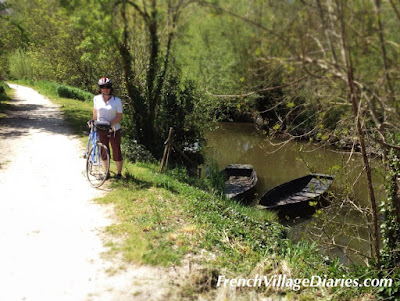 |
| Bordeaux |
France is a complicated being when it comes to administration and the beginning of 2016 marked a big change in the administrative regions.
France has over 35,000 communes, each with it’s
own Maire (Mayor), deputy Maires and councillors. Each commune is part of a
Community of Communes, a group of communes who pool some of their resources
together and ours (as it currently stands) is a group of 27 communes equalling
16,000 people. While small communes are being encouraged to join with their
neighbouring communes, Community of Communes are in some areas being forced to
join with other Community of Communes to ensure each one encompasses at least
20,000 inhabitants (although in rural areas where the population is low, an
exception has been made).
Then there are departments and above them, the
regions, of which there were 22, but are now only 13. We are in the Deux Sèvres
department, which was part of the Poitou-Charentes Région, until midnight on 31st
December 2015. We are now part of the new Grande Région, which still has no
official name, made up by amalgamating the Aquitaine, Limousin and
Poitou-Charentes. This is just the start of many changes that will happen in
France in the next five years, changes all brought about in the name of cost
cutting.
From a purely snobbish point of
view I quite liked the idea of being part of Aquitaine, a wealthier region,
further south, with more sunshine and sparkle than the Poitou-Charentes. Our
new Grande Région, still referred to as ALPC (Aquitaine, Limousin,
Poitou-Charentes), is now the biggest region in France, covering 84,000 km2,
which is equivalent in size to Austria, and has 720km of coastline. The
boundaries are almost identical to the borders of the ancient duchée of Aliénor
d’Aquitaine, (Eleanor of Aquitaine) duchess of Aquitaine and Comtesse du Poitou
in the 12th Century, who was also Queen consort of England from 1154
to 1189. With 5.8 million inhabitants it is the forth largest in France in
terms of population and equivalent to the population on Denmark. It is also the
largest region in France in terms of agriculture and holds second place in
terms of most popular visited tourist sites in France.
We are home to the Pyrenees and the Basque country, the Arcachon basin and Dune du Pilat, the cave art of Lascaux and the Dordogne valley, the vineyards of Bordeaux and Cognac and the Marias Poitevin national park, just to list a few of our specialities. We have it all, from mountains, coastline, history plus regional produce and we have been lucky enough to visit a lot of it by bike.
 |
| The Marais Poitevin |
We are home to the Pyrenees and the Basque country, the Arcachon basin and Dune du Pilat, the cave art of Lascaux and the Dordogne valley, the vineyards of Bordeaux and Cognac and the Marias Poitevin national park, just to list a few of our specialities. We have it all, from mountains, coastline, history plus regional produce and we have been lucky enough to visit a lot of it by bike.
We were sold this Grande Région on
the basis that every region has a top man, with an office, staff, official car
etc and therefore economies could be made by reducing expenses from the top
down. Naively I believed. However, on reflection our weather has been more
Limousin wet than Aquitaine sunny since the merger and while nothing much seems
to have been taken away from the other two old regions, here in
Poitou-Charentes we seem to have lost a lot and I’ve yet to see something
change for us for the better.
The first disappointing
announcement was the cancellation of our Nuits Romanes summer concerts. For eleven years the Poitou-Charentes has celebrated it’s 800 Romanesque churches by holding
outdoor music and dance performances during summer evenings. From the small villages
of a few hundred inhabitants to the big cities like Angouleme and Poitiers,
these concerts have been free and open to all and tourists, mainly French, have
visited the area to follow these events as they move around the region. I’m
sure the budget played a part in the decision to cancel, but also mentioned in
the press was the fact that it was unfair for the Poitou-Charentes to put on
this event when there was nothing similar in the Aquitaine or Limousin. It is
now gone from us, forever.
Last September when Ed went up to
Lycée we were able to apply for a ‘cheque book’ that contained two 35€ cheques.
These were handed to the parents association as full payment for a set of loaned
second hand textbooks, funded by the Poitou-Charentes. In Aquitaine (a more
wealthy region) a similar system existed, but whereas ours applied to all three
years at Lycée, the Aquitaine system only ran for the first year. In the
Limousin textbooks are free for everyone, for all three years. It seems that
five months was apparently not long enough to find a scheme that worked for all
of the ALPC, so Limousin will continue to be free as before, but
Poitou-Charentes will be brought into line with the Aquitaine scheme. This
means from September there will be no assistance with Lycée textbooks for two thirds of our lycée students,
Ed included.
It seems quite significant that
the Poitou-Charentes appears last in the initials ALPC as so far we have seen
plenty of cutbacks but no improvements and I’m just not convinced the other ex-regions
have been so badly affected. I'm not a fan of change and especially changes that take away benefits without offering alternatives.





No comments:
Post a Comment
Please don't be shy, I love to hear from you.